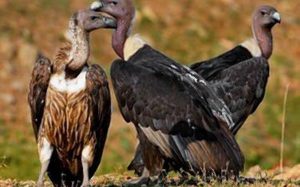Conservation Of Vultures:

150 vultures were seen in the Valmiki Tiger Reserve (VTR), Bihar, which has prompted a vulture conservation plan in the protected region of VTR.
- Vultures is one of the 22 species of large carrion-eating birds that live predominantly in the tropics and subtropics.
- They act an important function as nature’s garbage collectors and help to keep the environment clean of waste.
- Vultures also play a valuable role in keeping wildlife diseases in check.
- India is home to 9 species of Vulture namely the Oriental white-backed, Long-billed, Slender-billed, Himalayan, Red-headed, Egyptian, Bearded, Cinereous and the Eurasian Griffon.
- Most of these 9 species face danger of extinction.
- Bearded, Long-billed, Slender-billed, Oriental white-backed are protected in the Schedule-1 of the Wildlife Protection Act 1972. Rest are protected under ‘Schedule IV’.
- Recently, the Ministry for Environment, Forests and Climate Change launched a Vulture Action Plan 2020-25 for the conservation of vultures in the country.
- It will ensure minimum use of Diclofenac and prevent the poisoning of the principal food of vultures, the cattle carcasses.
- The Vulture Safe Zone programme is being implemented at eight different places in the country where there were extant populations of vultures, including two in Uttar Pradesh.
- To upscaling conservation four rescue centres will be opened like Pinjore in the north, Bhopal in central India, Guwahati in Northeast and Hyderabad in South India.
- The ministry has now also launched conservation plans for the red-headed and Egyptian vultures, with breeding programmes for both.
- To study the cause of deaths of vultures in India, a Vulture Care Centre (VCC) was set up at Pinjore, Haryana in 2001.
- Later in 2004, the VCC was upgraded to being the first Vulture Conservation and Breeding Centre (VCBC) in India.
- At present, there are nine Vulture Conservation and Breeding Centres (VCBC) in India, of which three are directly administered by the Bombay Natural History Society (BNHS).




